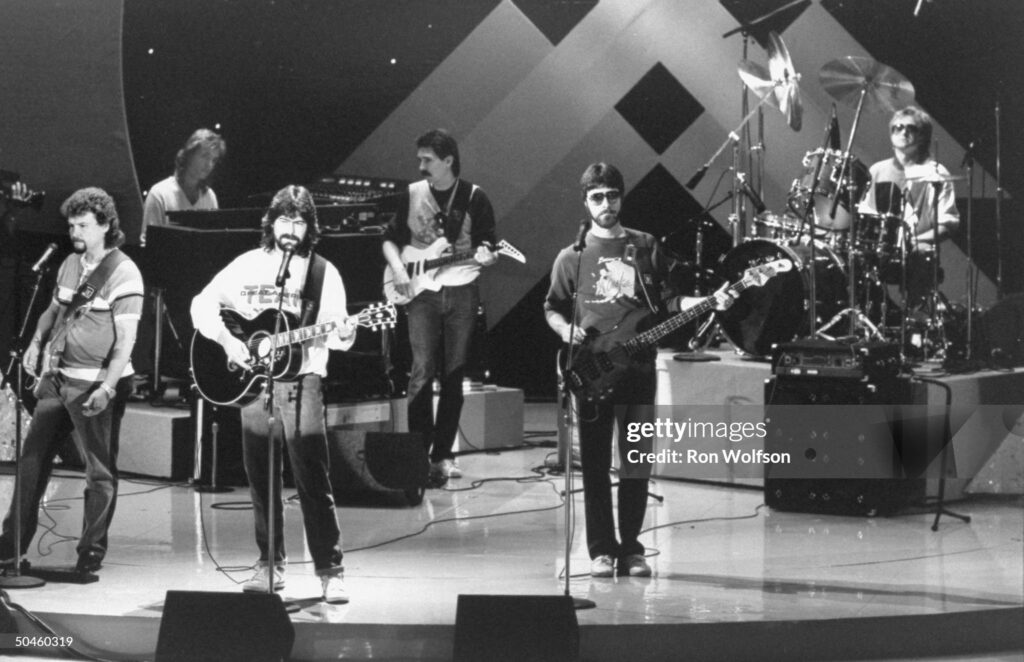
A quiet, dignified lament for two people who meant well and lost their way—“Lady Down on Love” listens gently to both sides of a broken promise.
Begin with the essentials that anchor memory. Alabama released “Lady Down on Love” on August 5, 1983 as the third and final single from their CMA-winning album The Closer You Get…. Written by lead singer Randy Owen, produced by Harold Shedd with the band, and issued on RCA Nashville, the record runs just under four minutes and carries the soft ache of a confessional spoken in a half-lit room. On the charts it became another pillar of the group’s early-’80s peak: No. 1 on Billboard’s Hot Country Songs, No. 18 on Billboard Adult Contemporary, No. 76 on the Hot 100, and a No. 1 on Canada’s RPM Country tally (with a Top-10 RPM AC showing). The single’s B-side—“Lovin’ Man”—came straight from the parent LP’s track list, further tying this hit to the album’s warm, radio-ready sound.
The song’s backstory is as plain and human as its melody. Owen has recalled that the seed arrived after a show in Bowling Green, Kentucky, when he learned a group of women were “celebrating” a friend’s divorce. The friend wasn’t celebrating at all—she sat in the club, mournful and quiet, wishing the night would turn back into an ordinary evening at home. That small, piercing scene became the song’s opening verse; in the second verse, Owen turns the camera to the husband, a man who stayed gone too long, made one betrayal too many, and now lives with the knowledge that trust is not easily mended. The chorus—“She’s got her freedom, but she’d rather be bound / to a man that would love her and never let her down”—feels less like judgment than a witness’s soft report.
Part of the record’s lasting tenderness is structural. “Lady Down on Love” is not a torch song that asks the room to choose sides; it is a two-view ballad that gives equal dignity to her loneliness and his regret. That balance was rare on country radio in 1983, and it’s one reason the track glides so easily into older hearts today. The verses move in conversational phrases—no ornate metaphors, only the weather of ordinary life: a first night out after years of marriage, a husband working long stretches, a single mistake that keeps echoing. Owen sings as if he’s protecting the story while telling it, letting the melody rise only where feeling insists. You can hear the restraint in the arrangement, too: the The Closer You Get… palette of clean guitars, gentle keys, and patient rhythm leaves air around the voice so the quietest words land with weight.
For listeners who lived through Alabama’s remarkable run, the single also marks a moment in the band’s evolution. By 1983 they had refined a country-pop warmth that could hold both dance-floor singles and late-night ballads, and “Lady Down on Love” completed a trifecta from the album—alongside “Dixieland Delight” and “The Closer You Get”—of country No. 1s that moved easily beyond the format’s borders. The record’s crossover touches (that modest Hot 100 presence, the AC reception) signal why so many remember it outside strictly country circles: the song behaves like a neighbor talking in a kitchen, not a sermon from a stage.
Meaning, here, is modest and grown. The lyric does not chase absolution or revenge; it simply witnesses the afterlight of a marriage: a woman counting the years she gave, a man stunned by how fast love can dull when work and absence set the table, both of them forced to admit that freedom can feel heavier than the life it replaced. For older readers, that recognition rings true because it refuses melodrama. Alabama names what many have learned: that endings do not always thunder; often they settle, and it is the settling that hurts. The title’s gentle wordplay—“Lady Down on Love”—isn’t a slight; it is a diagnosis delivered with care.
Return to the record now and notice the temperature of its kindness. Owen never presses; his phrasing leaves small silences for memory to walk through. The band answers with the lightest frame—steel-gray chords, brushed drums, a melody that rises only where the truth needs room. When the chorus comes back around, it doesn’t demand a sing-along; it offers a place to breathe. That is why the single sits so comfortably beside photographs in a drawer: it sounds like good manners in grief, the simple bravery of telling the story straight.
And the facts that began this memory are the same facts that keep it in our rooms: a No. 1 country hit from 1983, drawn from The Closer You Get…, written by the man who sings it, produced with the steady hand of Harold Shedd and the band, and carried—quietly, insistently—far beyond its first season on the radio. Some songs feel like arguments. “Lady Down on Love” feels like truth told kindly, which is why it still finds us when the house is quiet and the hour is late.